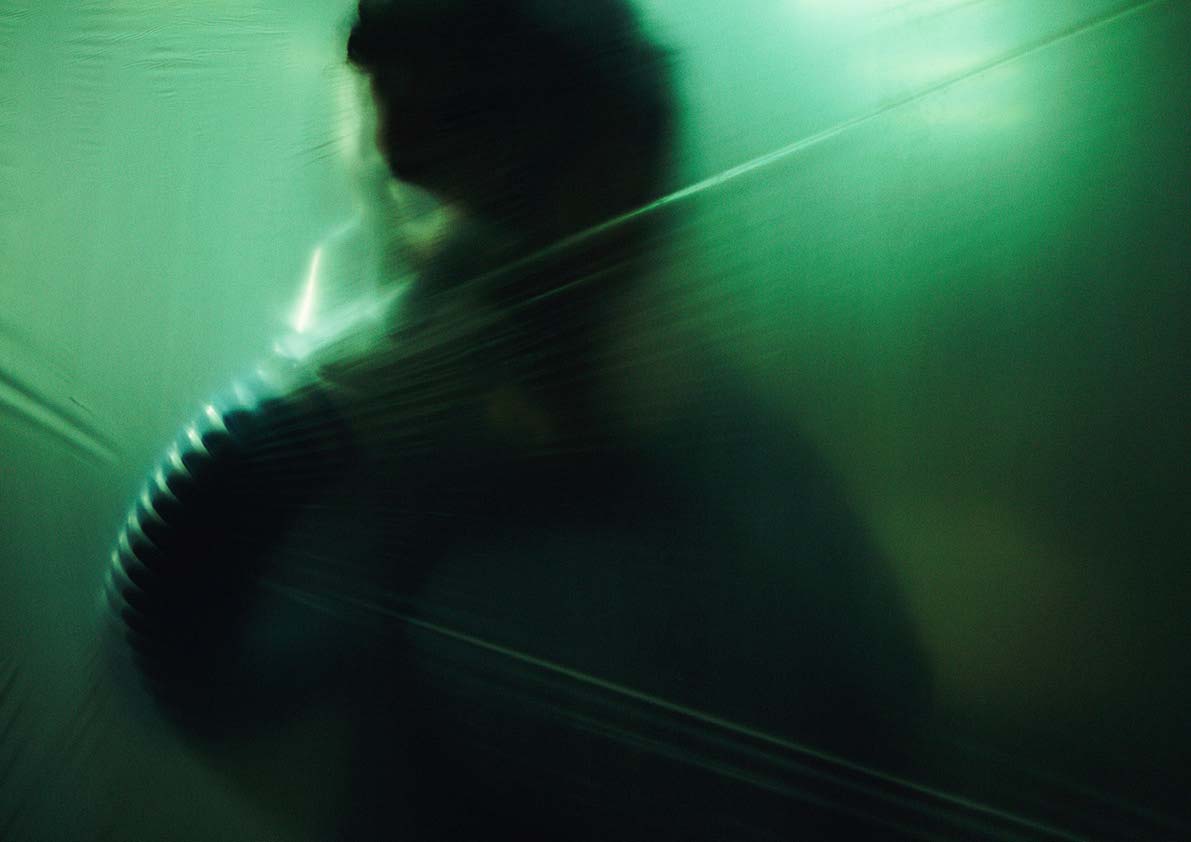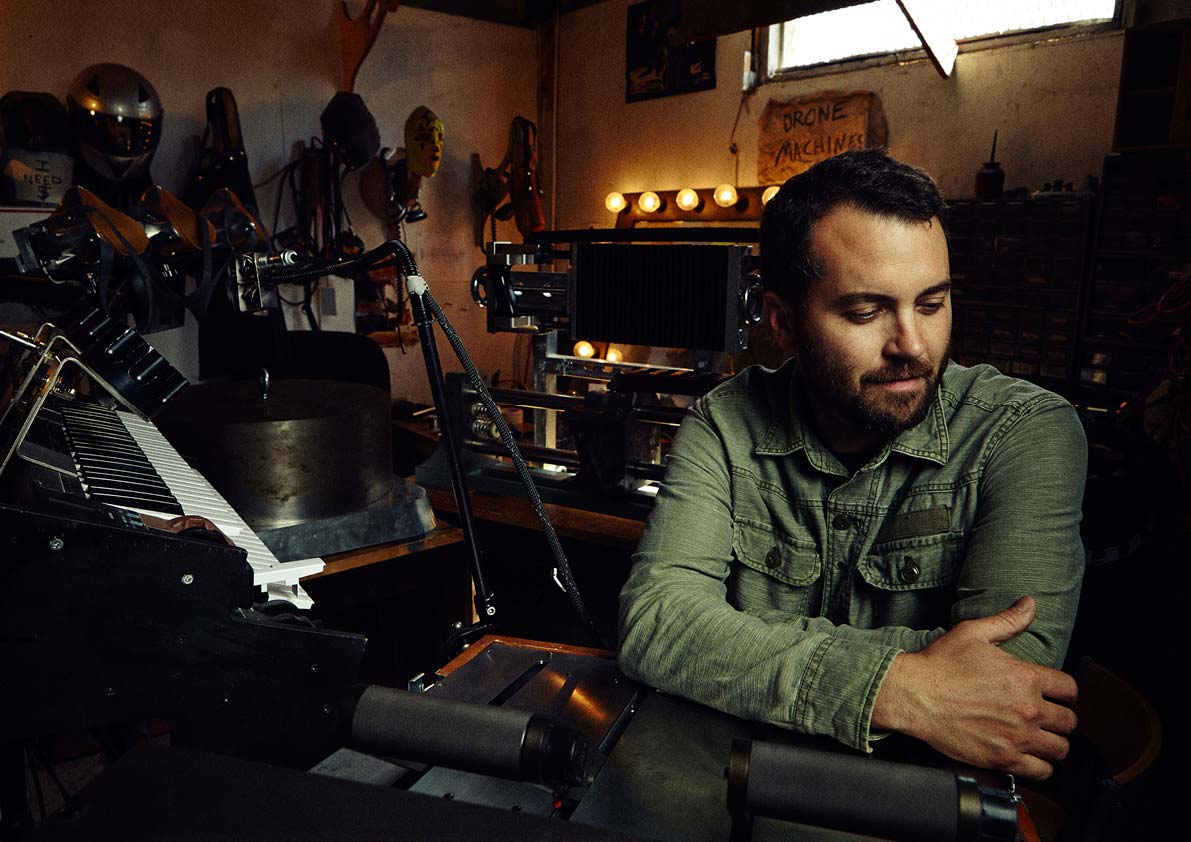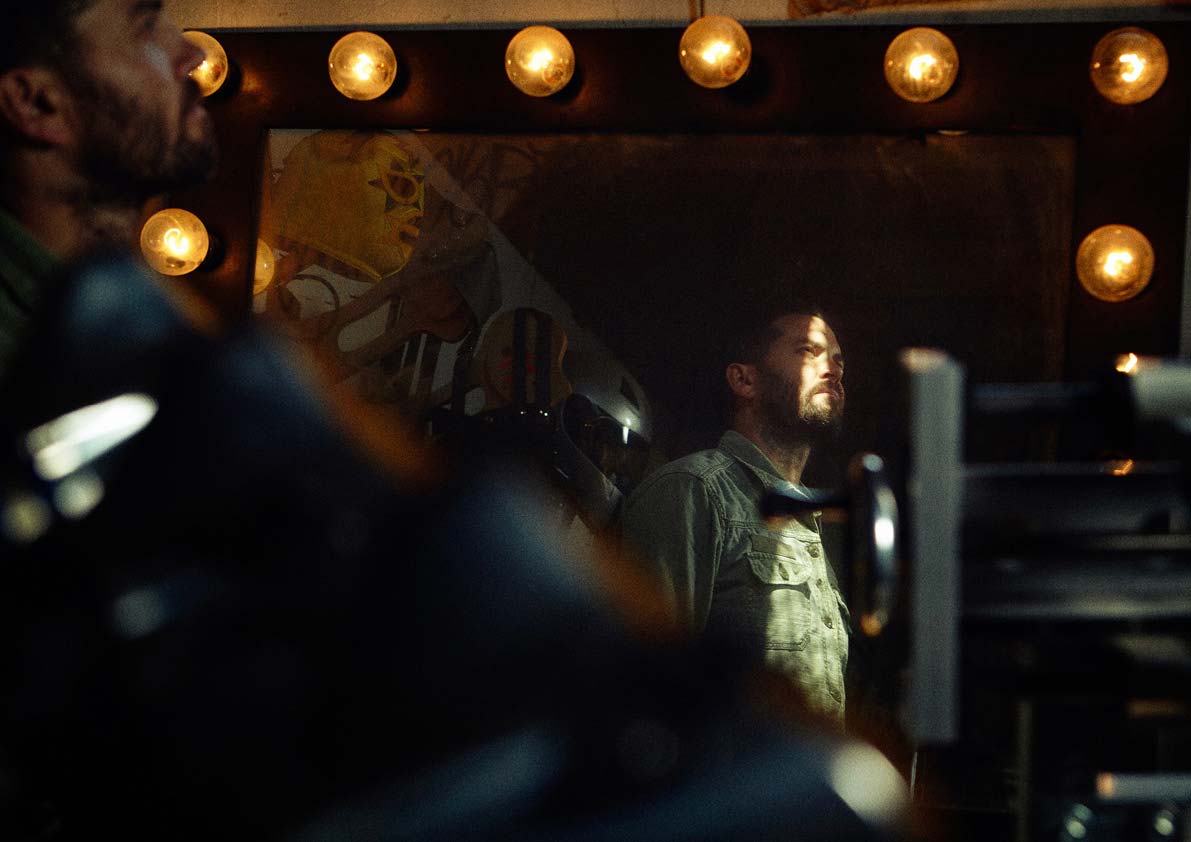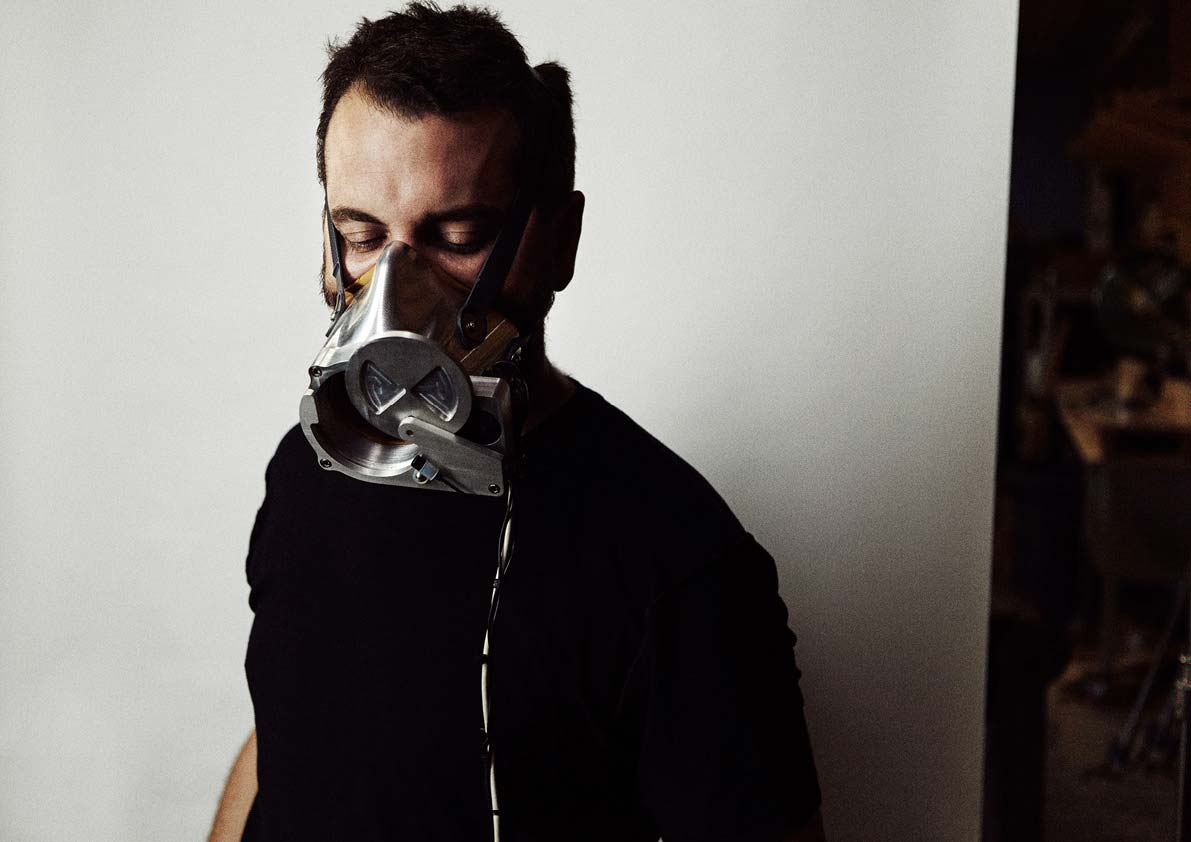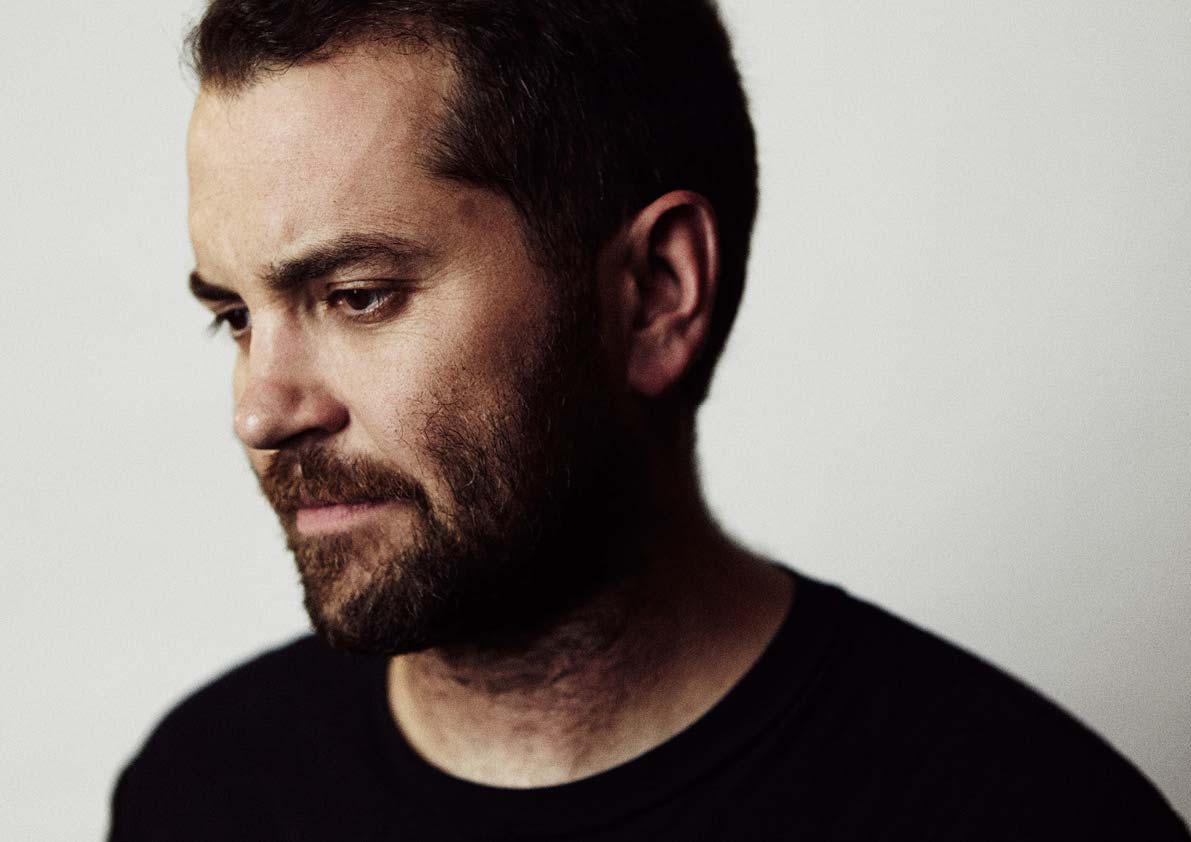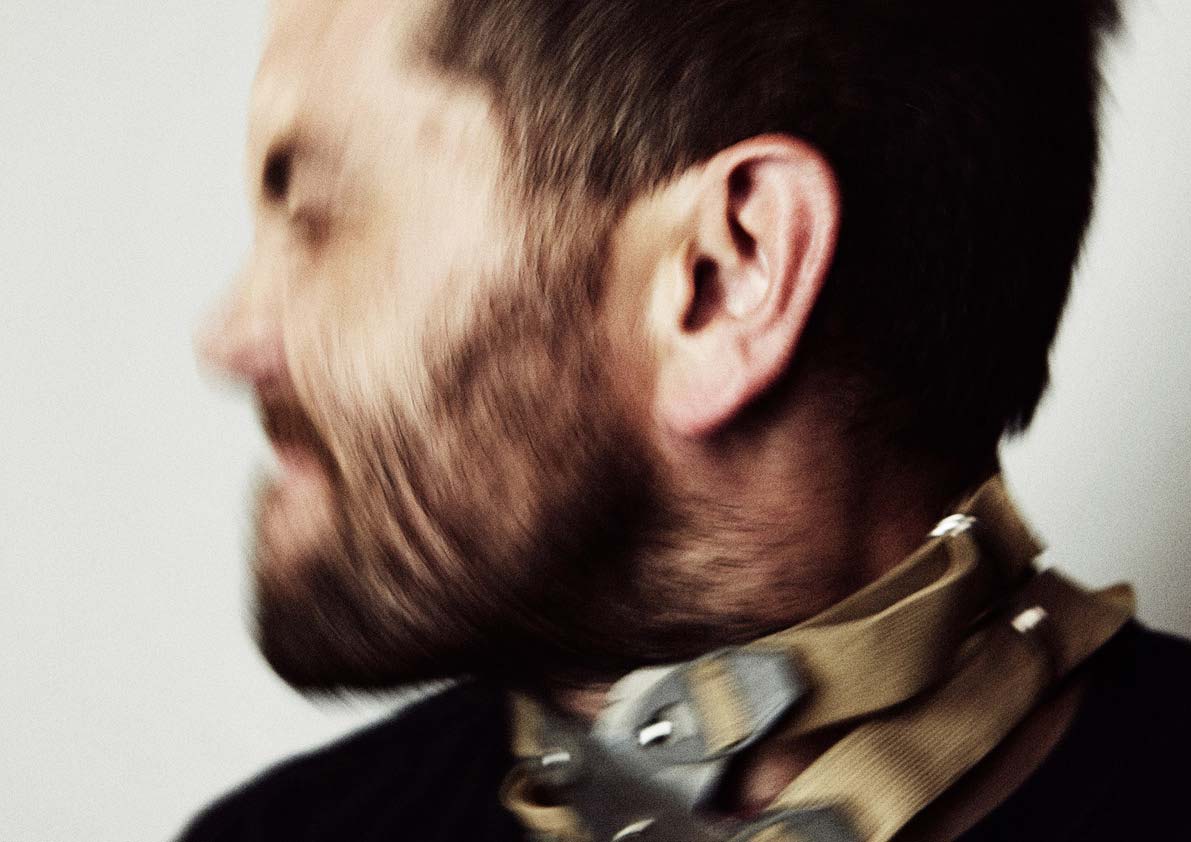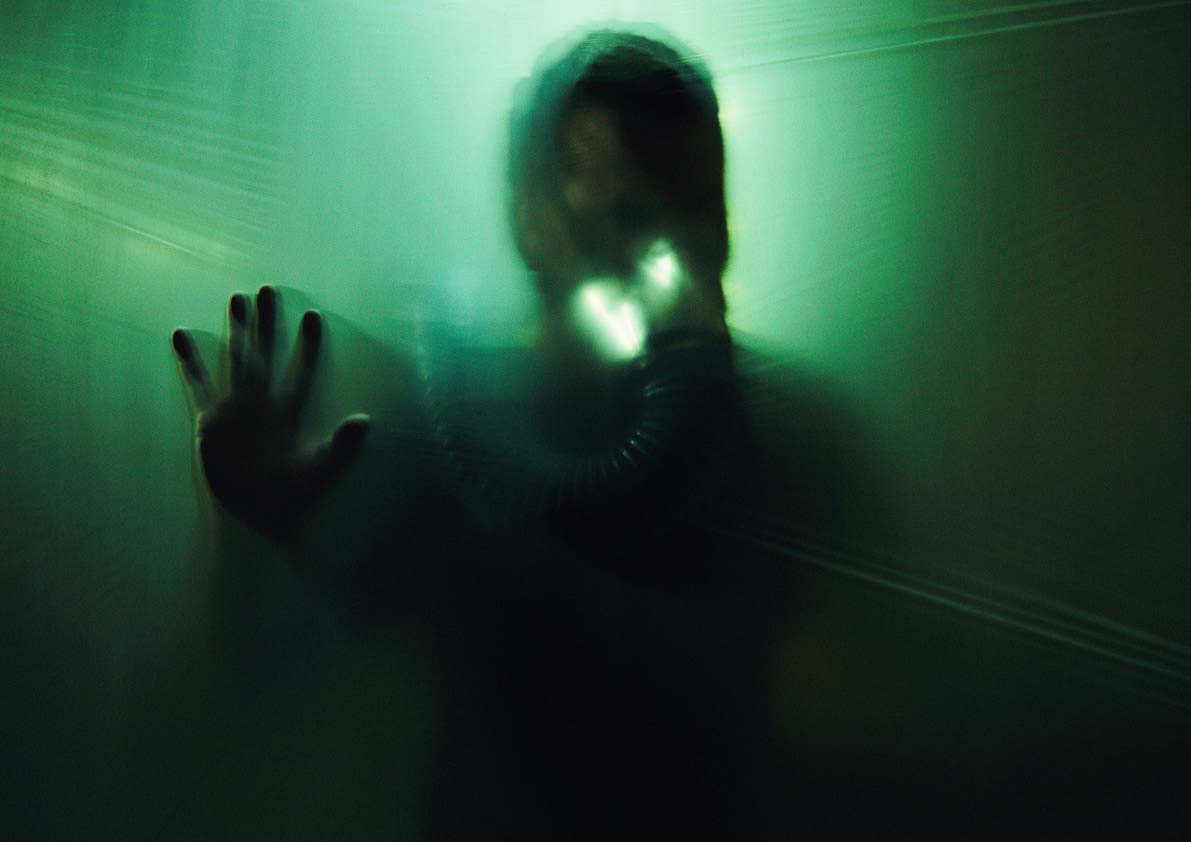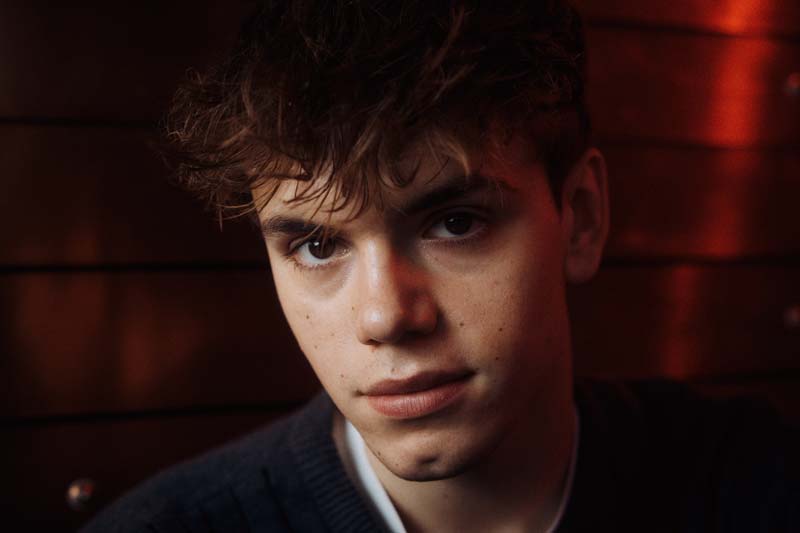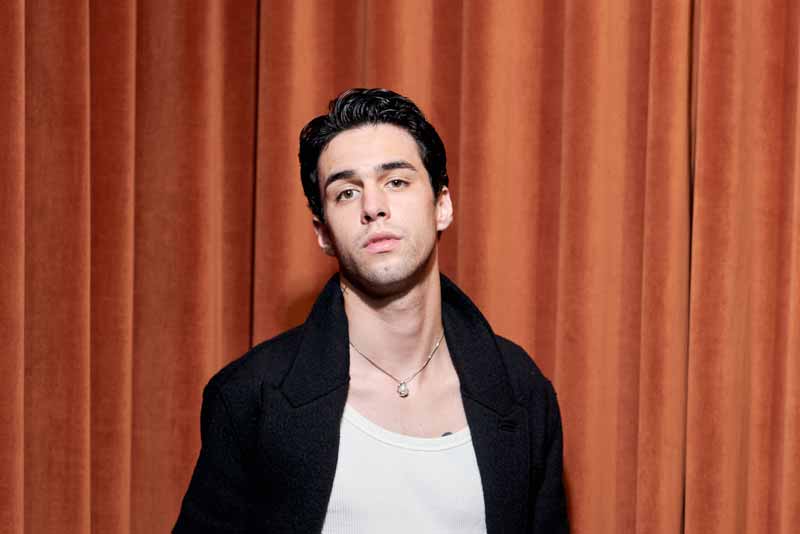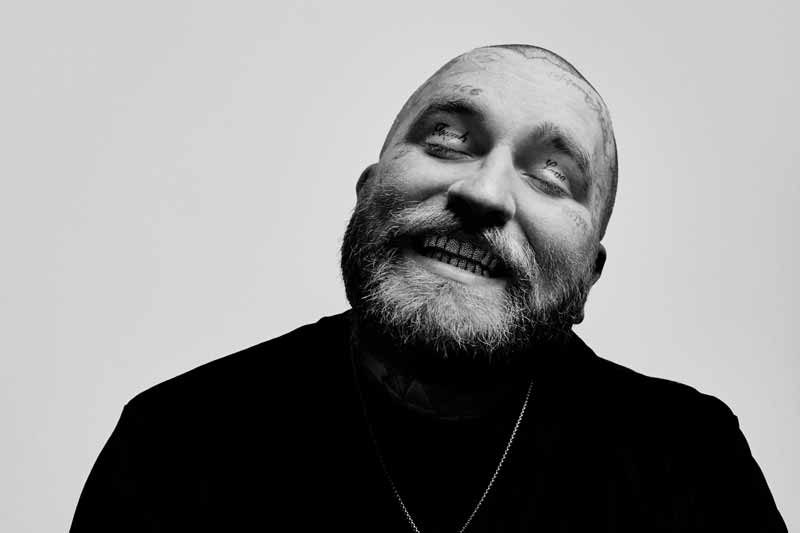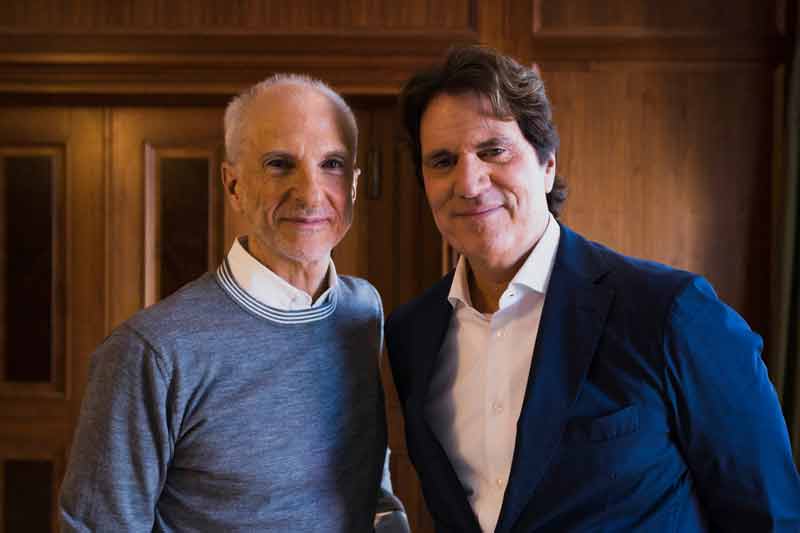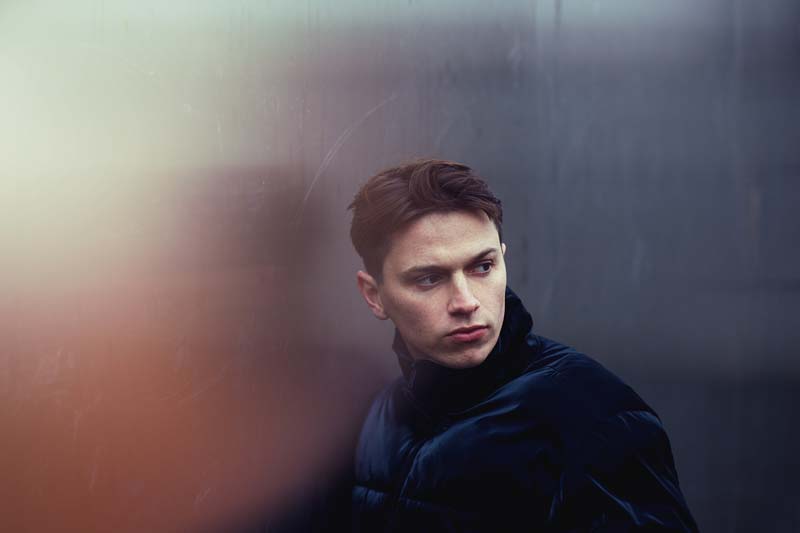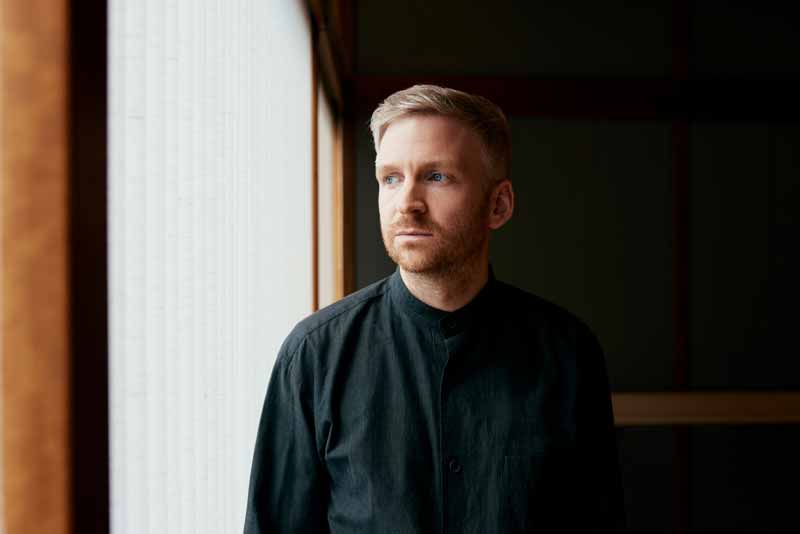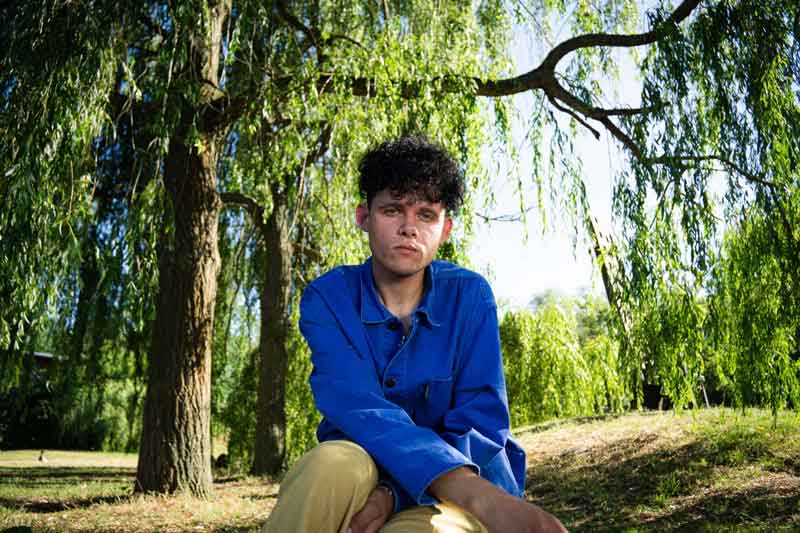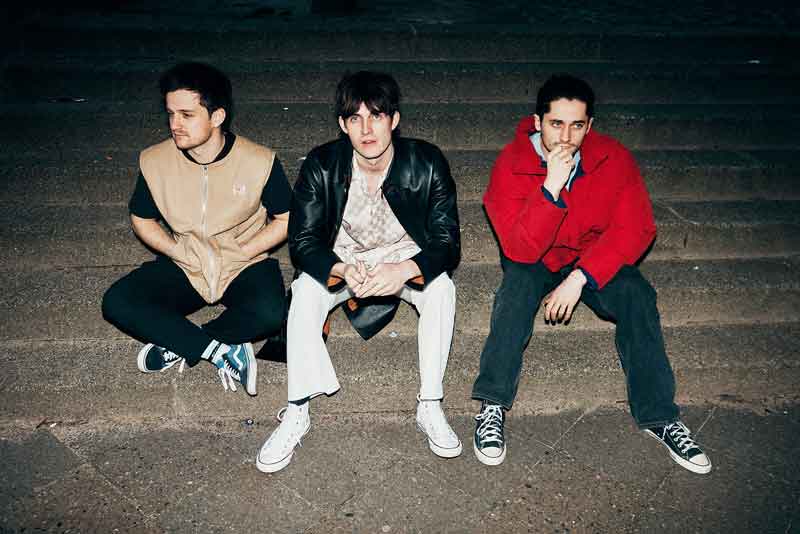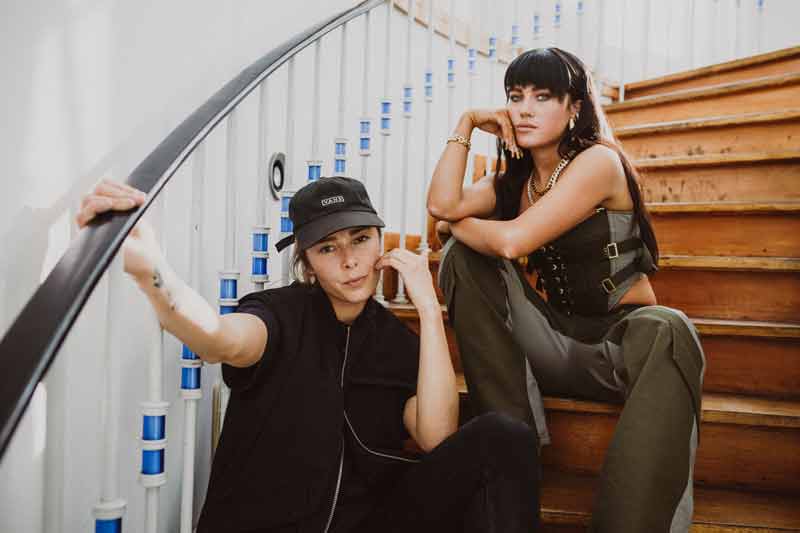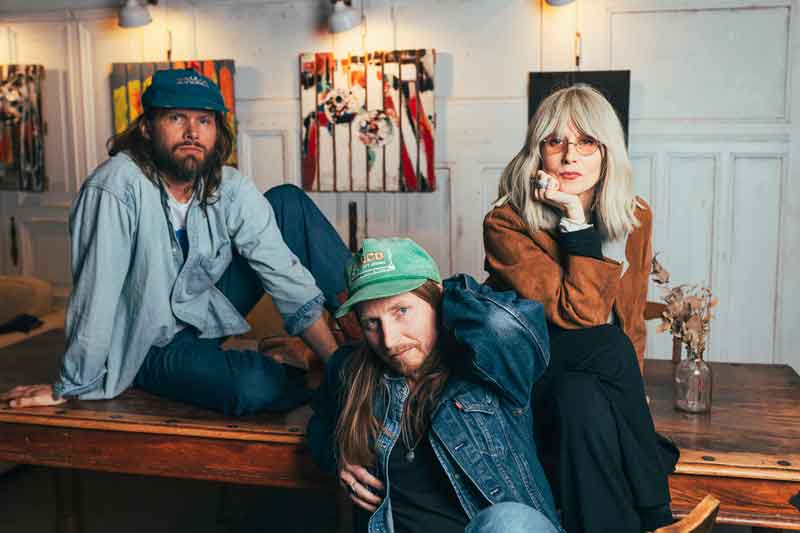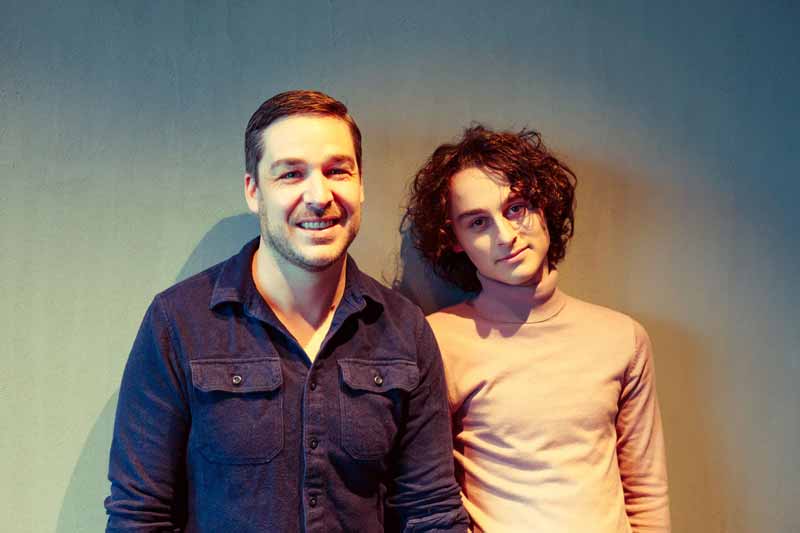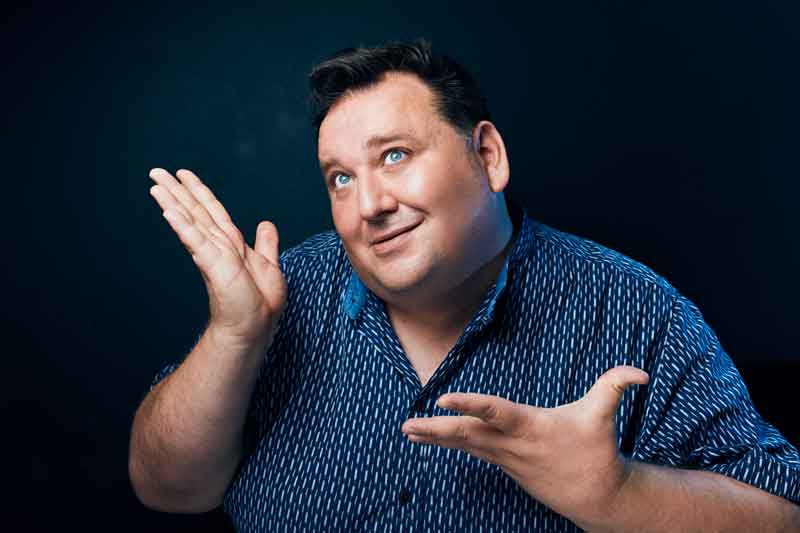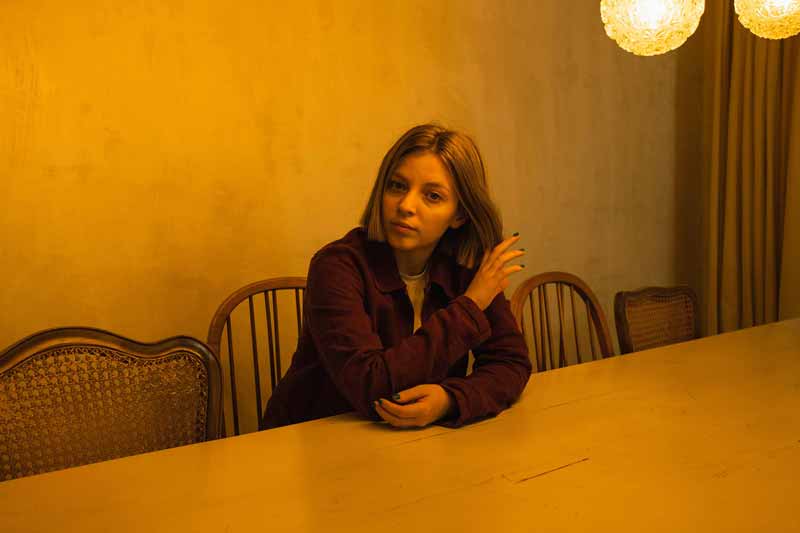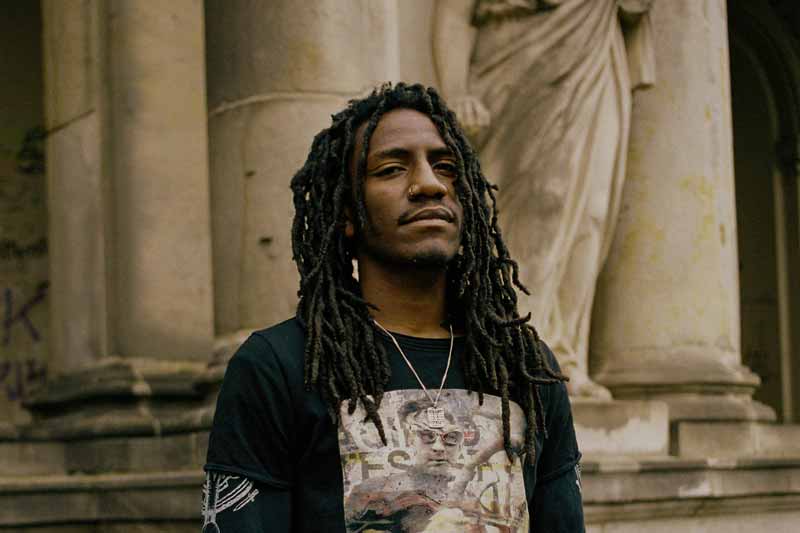Interview — Tristan Shone
A Man Behind The Machine
Mechanical engineer by day, musician by night – Tristan Shone from San Diego is a metal artist in the most literal of terms: steel, copper, and aluminum. Get surprised by his custom-designed instruments!
31. August 2014 — MYP N° 15 »My Homeland« — Interview: Erin Stegeman, Photography: Max Motel
On the eve of his departure back to his homestate of New Hampshire, I catch up with Tristan Shone, the RPI and UCSD graduate, one-man band, and musical cyborg behind Author & Punisher. Mechanical engineer by day, musician by night, he is a metal artist in the most literal of terms: steel, copper, and aluminum. Shone’s music is birthed through his own custom-designed instruments and speakers – which he refers to as sculptures. He is less traditionally “metal” and more Tony Stark, trading in his buttoned-up shirt and donning one of three self-designed masks while performing.
His shows are a spectacle, requiring superhero force to maneuver the “drones” and warp-speed to perfectly sync the complicated machinery. The result? A textured and visceral doom industrial sound that’s led to the creation of five albums over the last ten years and multiple domestic and world tours. Part man, part robot, part pioneer – perhaps somewhere between a love affair and addiction with his musical sculptures lies the real Tristan Shone.
Erin:
What made you want to transition from a full time engineer to artist?
Tristan:
It came out of desire of not getting enough creative fulfillment working in the engineering industry. I was trying to do the band thing on the weekends after I graduated school, but it just wasn’t working for me. I was sitting on my porch at 2am with a glass of whiskey and decided to go back to art school.
Erin:
Where did you study?
Tristan:
I went to Rensselaer Polytechnic Institute to study mechanical engineering then later to the University of California at San Diego for graduate school. The school itself has a heavy mechanical engineering program, so I was in close proximity to that. So I started getting into sculpture and that’s ultimately where Author & Punisher was created.
Erin:
Early on in your career there were a lot of fields merging – sculpture, robotics, and songwriting to name a few. Was there anyone in particular who inspired you to go in a particular direction?
Tristan:
Back at MIT there was a professor name Chris Csikszentmihályi . He’s a media artist, robotics, technologist guy. He made a couple autobots, introduced me to microcontrollers, and did a lot of things music-related that influenced me. There was also a fellow UCSD student and British artist, Matt Hope, who who was really into rave culture and speaker building. He shared some music and sculpture knowledge with me and we worked together a lot. Other then that, I just sat in a machine shop all day and drew up ideas on sound. Everyday I’d wake up in the morning, weld all day, go to the bar at night, and then do it again. It was the best three years of my life.
Erin:
Where did the title ‘Author & Punisher’ come from?
Tristan:
I grew up in a small town in New Hampshire, and I really wanted to play hockey. The only school that had it was the Catholic high school, so I went there. I just didn’t buy into the religious stuff, although I enjoyed learning about it. I would sort of mock it and wear these t-shirts that had Jesus on it, and one of the shirts read “Author & Finisher”. One night in college, I was stoned with my roommate. My band had just broken up, so I told him my new band is gonna be called “Author $ Finisher”. He said, “No, man it would be cooler if it were Author & Punisher!” It became this joke for a while, but then I went with it. A few years ago I was online and saw that there’s this like metal core Christian band named Author & Finisher. They all have Bieber hair.
Erin:
You should tour together.
Tristan:
I know! That would be insane. You know, I was never really an angsty person. I was challenging every bit of my teachings at that school, but I was really good friends with my teachers. I appreciated the conversations.
Erin:
Do you find your clean-cut appearance to be hindrance to your peers taking you seriously as a “metal” guy?
Tristan:
I think it’s definitely a disadvantage. I have to admit I have an ego about this. I feel like my music deep down is heavy. My gimmick is I make my own instruments. I feel like I don’t want to have any more gimmicks than that. I don’t really like when poeople get up there and perform wearing flip flops. I think there’s something to be said about showmanship. My music is not the most listenable stuff – it’s heavy, underground, rare. The scene’s changing though; there’s an industrial rebirth. It’s frustrating sometimes because there are bands that are newer than me and they’ve got more likes on Facebook (laughs)…I don’t know…I’m 36, I’ve been doing this for ten years, and I’m not changing anytime soon. My music is my music. I’m in this for the long haul.
I have an idea in my head of what a good interaction would feel like for a sound.
Erin:
Which comes first – the instrument or an idea for a sound?
Tristan:
I have an idea in my head of what a good interaction would feel like for a sound. It all started out with bass tones, after I had started building speakers. Sometimes I think, “OK this would sound better if I just had a lever I could move and make an ukk, ukk, ukk sound”. You almost cannot write things before you sit down with the instruments. I cannot write anything faster than 90 BPMs because it’s difficult to change the notes with some of the machinery. My next album will be my first one I’m recording in a studio, so when I write, I try to make sure it’s for instruments I can actually use in a studio setting.
Erin:
What’s the upkeep like for your machines?
Tristan:
The cool thing about them is physically they’re very strong. There are bearings and components that other instruments don’t have. The whole thing costs close to $3000 and it’s like never gonna break. The other side though, are the electronics. So I’m using this one piece that has like USB plugs and connectors that I’m constantly changing to work with new software.
Erin:
There’s a lot of talk about digitized music killing the industry. What’s your take on it?
Tristan:
I mean I understand what they’re saying. I was listening to an interview about this on NPR’s Radio Q and Jian Ghomeshi was interviewing Neil Young and Tom Petty. Let me just say I’m not a big Tom Petty fan. I think he’s arrogant. I mean, that’s just something that old people say to young people about their music, “It’s too this” or “too that”. If I listened to that old shit on a 45, it’d also sound like it’s missing a bunch of frequencies. Listen to an Ella Fitzgerald record on a 45. It doesn’t have a big dynamic range. Maybe when Pink Floyd put out their vinyl in the late 70s, early 80s it had a really great quality to it…I don’t know…I think we’re in a time right now where it’s really high fidelity. We have the best speakers that we’ve ever had in clubs. We’re probably overstimulated and it’s all too loud, sure, (laughs) but I absolutely love over-compressed, blown out shit. I just feel like…that’s old people talking. Tom Petty would not be fun to hang out with. I do like Neil Young though.
Erin:
Who are you listening to today?
Tristan:
I’ve really been into some of these dark electronic bands. There’s this whole label called Modern Love over in Manchester, UK, and has people like Andy Stott and Millie & Andrea. They’re almost like industrial but they don’t have that angsty Marilyn Manson, Nine Inch Nails feel. It’s more of a drum and bass early 90s sound. It’s really mellow, which I really like.
Erin:
What’s next for you?
Tristan:
I’m touring with a band that’s pretty great and getting some notoriety lately called 3TEETH in September. I’m also writing and planning on being in the studio in November recording my next album.
Erin:
What can you tell me about the next album?
Tristan:
I want this album to be a little bit different. I want it to sound more like how it sounds when I play live, rather than when I track everything over and over. If I can’t play it live all at one time, I don’t want to record it. I’m reprogramming my machines for more functionality. Some of my instruments have been too large to tour with in the past, so that’s been a real hindrance.
In terms of sound, the last album had some more pop elements, like more piano and singing and things that sounded like real drums. This will sound nothing like that. It’s much more heavy metal industrial. This is more back to my roots. Philip Anselmo from Pantera is helping to produce it …crap, maybe I wasn’t supposed to say that. Ah, I’ll just let him know I let it slip… anyway, he’s all about getting back to what Author and Punisher is really about: chaotic heavy metal.
I’m better off being an engineer. I work for the university three days a week, and then I do my music at night.
Erin:
Have you sold any of your instruments? Is there a market for that?
Tristan:
It’s not like I haven’t thought about it. I wish there were more interest. It’s an incredibly small market – even the best guitar companies are doing terribly. I’m better off being an engineer. I work for the university three days a week, and then I do my music at night. That’s still the best financial thing for me. If I go to trade shows and become the marketing guy or the spokesman, it kind of takes away from the fact that these are sculptures. I don’t necessarily care if no one else uses them or wants them. They really only work for me. It’s like your grandfather’s old car that only he can drive – you have to punch it a certain way to get it to work.
His machines are better suited to take the wear and tear from each performance than his human body. I can hear exhaustion in his voice, and he confirms he is overdue for his upcoming vacation.
Beneath the machinery is an under-appreciated and overworked man aware of his own mortality. “I needed someone to help me,” he says regarding his recent change up with his management team. We say goodbye and I wish him a sincere „bon voyage“. Even super-humans need a recharge.
Tristan Shone is a 36-year-old artist living in San Diego, California.
